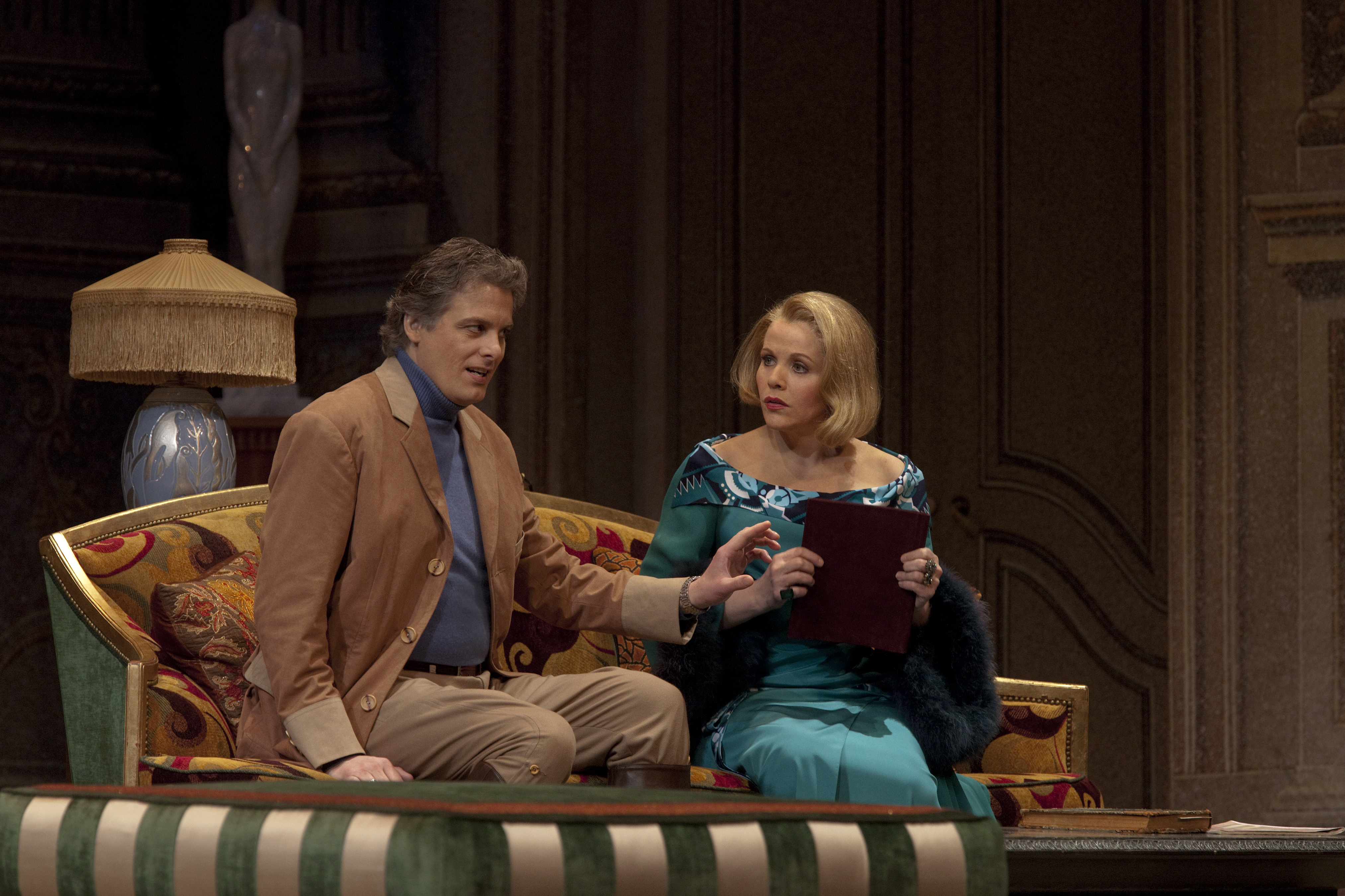
Words or music? Both are glorious in Lyric’s ‘Capriccio’
Renée Fleming has taken her time bringing one of her most celebrated operatic roles, Countess Madeleine in Richard Strauss’ “Capriccio,” to the company for which she serves as creative consultant.
But the wait has been worth it.
By John von Rhein, Chicago Tribune
Strauss’ 15th and final opera returned to the Lyric Opera repertory after a 20-year absence Monday night at the Civic Opera House, with Fleming, who had not appeared in a fully staged production at Lyric since 2008, heading a superb ensemble, well, superbly.
Add to that a most intelligent production and a veritable master class in Strauss conducting from music director Andrew Davis, and you had a classy contribution indeed to the composer’s sesquicentennial.
Strauss called his valedictory opera a “conversation piece” rather than a music drama. “Capriccio” is an opera about opera, or, more specifically, about the glory that is music theater. With a libretto by the composer’s colleague, conductor Clemens Krauss, “Capriccio” as an old master’s jeu d’esprit built around a musico-literary conceit: What’s more important – the words or the music?
Nothing much happens in the course of almost three talky hours (thank goodness for surtitles), but the ravishing invention the 78-year-old composer poured into his score renders the point irrelevant.
The words-vs.-music conflict is symbolized by the rivalry between the poet Olivier (Norwegian baritone Audun Iversen, in a fine Lyric debut) and the composer Flamand (tenor William Burden). Each artist is courting the rich, widowed Countess at her birthday fete. Flamand has written a string sextet for her, Olivier a sonnet. The latter is outraged when his rival sets the sonnet to music and sings it for the countess at the harpsichord.
Clearly flattered by the young men’s attentions, the Countess never does decide whose proposal to accept. In the great final monologue that lies at the beating heart of “Capriccio,” she realizes she cannot choose one over the other, for to do so would mean losing the other, and the opera the three are hoping to create would come to naught.
John Cox’s production, recreated here by Peter McClintock, updates the setting from the 1770s to Paris in the 1920s, making the inherent aesthetic issues feel more contemporary. (Never mind the pointed references to Gluck’s latest operas). To decors by the late Mauro Pagano are added Robert Perdziola’s elegant costume and interior designs – faded Art-Deco realism, with French doors opening onto a garden ultimately bathed in the moonlight (Duane Schuler is the lighting designer).
Lyric inserts an intermission into the one-act opera, thereby making the show less of an endurance test for the posteriors of its patrons. Well aware that Strauss never intended his intimate opera to be presented in a 3,500-seat theater, Lyric is providing video screens in the balconies for selected performances.
Strauss’ sumptuous music suits Fleming’s vocal gifts and stage persona particularly well at this stage of her career. The “people’s diva” may not command the rich, seemingly limitless float at the top of her range she once had, but the peaches-and-creamy tone and melting phrases that make her today’s go-to Strauss soprano remain. As witty and charming as she is beautiful, Fleming brought touching introspection to the final scene, making a poignant exit with some of the most sublime music Strauss ever composed.
The colorful characters that passed through the Countess’ salon were a most companionable lot in their own right.
The Count, Madeleine’s brother (Bo Skovhus), is a boorish dilettante who prefers military marches to opera and is enamored of the actress Clairon (Anne Sofie Von Otter). The dependable Danish baritone sank his teeth into his hammy pronouncements, while the splendid Swedish mezzo-soprano played Clairon with a flamboyant hauteur to match her over-the-top flapper outfits.
Burden and Iversen matched each other in vocal quality – the American tenor’s clear projection was especially good – and both men made sympathetic figures of the Countess’ ardent suitors. Peter Rose was announced as suffering from a throat infection, but the British bass soldiered on heroically, making it through the impresario La Roche’s impassioned apostrophe to “the noble theater” through sheer force of will.
Juan Jose de Leon and Emily Birsan made funny caricatures of stock Italian singers frantically upstaging each another. The brief exchange between David Govertsen’s weary Majordomo and Keith Jameson as the mousey prompter, Monsieur Taupe, was another choice bit of business. Good, too, was the octet of male servants, most of them members of the Ryan Opera Center apprentice program.
“Capriccio” holds a special place in Davis’ podium career. It was with this opera that he made his operatic conducting debut in 1973, and it was he who led its Lyric Opera premiere in 1994, six years before he was named music director.
Fully inside the opera’s conversational ebb and flow, Davis elicited exceptionally sensitive, refined playing from the Lyric Orchestra, beginning with the sublime sextet that opens the opera and continuing through the touching final pages. Principal horn Jonathan Boen did a fine job of evoking Strauss’ musical moonlight.
If “Capriccio” always will be more a connoisseurs’ opera than a big crowd-pleaser on the order of “Der Rosenkavalier,” Strauss’ glorious music makes the opera a rarefied treat eminently deserving of revival whenever the operatic stars are in alignment. They most certainly are in Lyric’s loving revival.